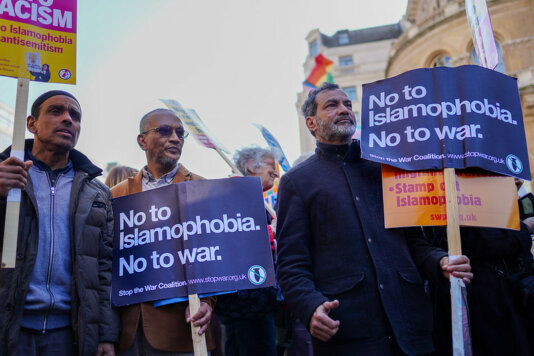- About
- Topics
- Story
- In-Depth
- Picks
- Opinion
- News
- Donate
- Signup for our newsletterOur Editors' Best Picks.Send
Read, Debate: Engage.
| January 03, 2018 | |
|---|---|
| topic: | Human Rights |
| tags: | #Muslim, #Muslim Council of Britain, #racism |
| located: | United Kingdom |
| by: | Federica Tedeschi |
Further data released by "Muslims in Numbers", a snapshot of the state of British Muslim life based on the 2011 Census numbers and launched by the Muslim Council of Britain, reads that ‘The Muslim community stands at 2.71 million in 2011’.
Furthermore, Muslims in Britain, who are mainly Asian or Asian British, are geographically widely dispersed and choose cities over the countryside, making up less than 5% of the overall UK population. Having a higher than national young community, however, they can be acknowledged as a strategic asset at a time when the proportion of senior citizens in Britain is constantly increasing.
The list of data and percentages goes on, but how does it feel to be a Muslim in the 21st century multicultural UK, a country where it is believed that Muslims have currently reached 3 million?
Producer Fatima Salara, who is also the BBC commissioning editor for religion and ethics, answered to this complicated question through "Muslims like us" BAFTA-winning BBC series, aired a year ago on BBC2.
Over ten days a diverse group of ten Muslims shared a house in York, their lives as well as their often-contrasting views on integration, sexual orientation, career choices and of course, Islam.
At first glance Britain Muslims are all united in faith, however, in Muslim homes all over the country, there is a perennial discussion about what and who best represents Islam. Is it correct or even possible to define a British Muslim liberal, moderate or conservative? Some suggest an orthodox version of the faith is common in Britain, whereas others demand compromises to be made by Muslims in order to integrate.
In this unique social experiment in two episodes which is "Muslims Like Us", five women and five men showed the public their passionate debates, disagreements and sometimes humour. Acknowledging that charity is at the heart of Islam, the group also volunteered to serve lunch to homeless people in Leeds.
Can all these dilemmas played out for real provide the public with an exhaustive explanation of what it is like to be a British Muslim in nowadays multicultural society?
Comedian and humanitarian Nabil Abdul Rashid, one of the ten housemates of the series, opened to the public on a YouTube video, halfway through the experience in the house, expressing his disappointment as “it was calculated what everybody in the house would do, telling specific things to you, and as soon as you reacted on something, you were racist”. He added that having had to deal with several racist comments over a period of five days, had felt rather frustrating.
There is however much more than religion and contrasting ideas on today’s society to the Muslim community, whose history in Britain that stretches back a millennium. The arrival of groups of sailors recruited from the Indian subcontinent to work for the British East India Company, marked a turning point in the 18th century, according to Everyday Muslim, an organisation that celebrates Muslim Heritage in the UK.
Aware of the fact that there are just a few archive collections in Britain documenting the history of the Muslim community, the association has been working closely with a variety of artists, archivists, educators and community project leaders up and down the country to create a unique and comprehensive directory of existing or new Muslim and Islamic collections, projects and resources which includes arts, literature and inventions. Along with the Bishopsgate Institute of London, they also organised a one-day symposium in 2012 with a range of speakers from academic, arts, heritage and media organisations to answer to a plethora of questions about the British Muslim culture.
“A sense of identity for many young Muslims is formed from a mixture of experiences within the community, educational institutions, religion and family. Yet many young Muslims feel they have an inadequate grasp of their own heritage and history, against which to balance the other influences in their lives", according to Young Muslims Speak, Peace Direct, 2006.
The Everyday Muslim team are currently planning archive projects to be shown in 2018 and themes include the heritage story of British black Muslims in London as well as the social and personal legacy of British Muslim women in the past: the aim is to engage with yesterday’s events to inform the present.
By copying the embed code below, you agree to adhere to our republishing guidelines.
